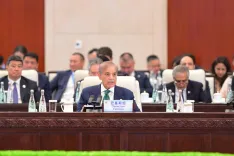Lok Sabha Approves Oilfield Amendment Bill to Boost Investments

Synopsis
Key Takeaways
- Amendment Bill passed to reform oil and gas investments.
- Introduces a unified permitting system for petroleum leases.
- Enhances ease of doing business in the sector.
- Focus on stability and dispute resolution for investors.
- Increases penalties to ensure compliance.
New Delhi, March 13 (NationPress) The Lok Sabha has approved the Oilfield (Regulatory and Development) Amendment Bill, 2024, aimed at reforming the legal structure to draw in greater investments for the exploration and production of oil and gas within the nation.
This Bill was previously ratified by the Rajya Sabha on December 3, 2024.
In the past decade, the government has initiated numerous reforms, including a pivotal transition from a ‘production sharing’ framework to a ‘revenue sharing’ model for contract awards, streamlining procedures, and alleviating regulatory burdens to enhance oil and gas exploration and production in India. Furthermore, the unblocking of previously designated 'No-Go' zones for new exploration, deregulation of crude oil, and granting marketing and pricing autonomy for natural gas were additional measures taken in this direction.
According to an official statement, “As a significant result of these extensive reforms, over 76 percent of the active acreage under oil and gas exploration in India today has been allocated since 2014.”
While presenting the amendment Bill, Minister of Petroleum and Natural Gas Hardeep Singh Puri remarked that the current system, which primarily concentrates on licensing, regulatory oversight, and royalty collection, required realignment to foster Ease of Doing Business and collaboration between the Government and Contractors. He noted that comprehensive dialogues with industry leaders, potential investors, and stakeholders were conducted to identify systemic pain points.
Given the lengthy gestation periods and substantial project risks involved, investors are in need of a legal structure that is straightforward, stable, predictable, and provides access to an efficient and expedited dispute resolution mechanism. The amendments suggested in the Bill are crafted to fulfill investor expectations while advancing, safeguarding, and prioritizing India’s interests, he added.
The minister stated that the Amendment Bill aims to eliminate the historically flawed practice of combining mining and petroleum operations into a single category. It also introduces a unified permitting system known as petroleum leases, which will replace the current system that mandates Contractors to secure multiple licenses for various activities related to different types of hydrocarbons. This Bill will aid in the development of comprehensive energy projects and the adoption of innovative technologies such as Carbon Capture Utilization and Sequestration (CCUS) and green hydrogen.
He further noted that the Bill seeks to assist smaller operators by enabling the sharing of resources and infrastructure among different operators to enhance the viability of oil blocks.
The Bill also strives to address one of the primary concerns of international oil companies keen on investing in India by ensuring operational stability in terms of lease duration and associated conditions. It emphasizes effective alternative dispute resolution mechanisms, ensuring that conflicts can be settled promptly, fairly, and cost-effectively, the minister mentioned.
To promote compliance with the Act’s provisions, penalties have been raised to Rs 25 lakh and up to Rs 10 lakh per day for ongoing violations, ensuring a deterrent effect. To enhance the system’s effectiveness and efficiency, the Bill establishes an adjudication authority and an appeals mechanism for penalty imposition.
Puri stressed that the Bill is designed to uphold cooperative federalism and does not infringe upon the rights of the states in any capacity. States will continue to issue petroleum leases, necessary statutory clearances, and receive royalties as they have previously.
The minister underscored that with the Bill's passage, the provisions will enhance the “ease of doing business”, position India as an appealing destination for oil and gas production, and play a crucial role in unlocking the hydrocarbon potential of our resource-abundant nation.








